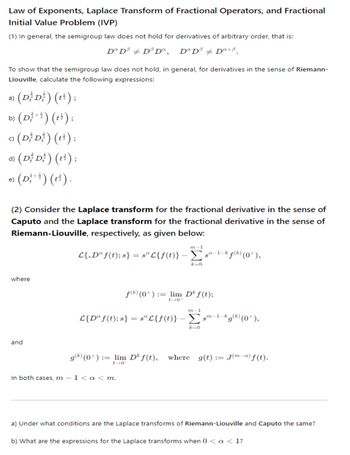
Advanced Engineering Mathematics
10th Edition
ISBN: 9780470458365
Author: Erwin Kreyszig
Publisher: Wiley, John & Sons, Incorporated
expand_more
expand_more
format_list_bulleted
Question
Solve this

Transcribed Image Text:Law of Exponents, Laplace Transform of Fractional Operators, and Fractional
Initial Value Problem (IVP)
(1) In general, the semigroup law does not hold for derivatives of arbitrary order, that is:
Dº Dª Dª D°, DºD³ +D+B
To show that the semigroup law does not hold, in general, for derivatives in the sense of Riemann-
Liouville, calculate the following expressions:
a) (DD) (t);
b) (D+) (+);
c)
(DD) (+);
d) (DD) (t³);
e) (D) (t).
(2) Consider the Laplace transform for the fractional derivative in the sense of
Caputo and the Laplace transform for the fractional derivative in the sense of
Riemann-Liouville, respectively, as given below:
m-1
-1-k
L{.D°f(t); 8} = 8° L{f(t)} -Σs¹ƒ) (0°),
where
and
f(*) (0*) := lim D*ƒ(t);
m-1
-1-k
£{D° f(t); } = 8º£{f(t)} - Σg(*) (0*),
-0
9) (0+) = lim Dƒ(t), where g(t)J("-") ƒ (t).
In both cases, m-1<a<m.
a) Under what conditions are the Laplace transforms of Riemann-Liouville and Caputo the same?
b) What are the expressions for the Laplace transforms when 0 < a <1?
Expert Solution
This question has been solved!
Explore an expertly crafted, step-by-step solution for a thorough understanding of key concepts.
Step by stepSolved in 2 steps

Knowledge Booster
Similar questions
arrow_back_ios
arrow_forward_ios
Recommended textbooks for you
 Advanced Engineering MathematicsAdvanced MathISBN:9780470458365Author:Erwin KreyszigPublisher:Wiley, John & Sons, Incorporated
Advanced Engineering MathematicsAdvanced MathISBN:9780470458365Author:Erwin KreyszigPublisher:Wiley, John & Sons, Incorporated Numerical Methods for EngineersAdvanced MathISBN:9780073397924Author:Steven C. Chapra Dr., Raymond P. CanalePublisher:McGraw-Hill Education
Numerical Methods for EngineersAdvanced MathISBN:9780073397924Author:Steven C. Chapra Dr., Raymond P. CanalePublisher:McGraw-Hill Education Introductory Mathematics for Engineering Applicat...Advanced MathISBN:9781118141809Author:Nathan KlingbeilPublisher:WILEY
Introductory Mathematics for Engineering Applicat...Advanced MathISBN:9781118141809Author:Nathan KlingbeilPublisher:WILEY Mathematics For Machine TechnologyAdvanced MathISBN:9781337798310Author:Peterson, John.Publisher:Cengage Learning,
Mathematics For Machine TechnologyAdvanced MathISBN:9781337798310Author:Peterson, John.Publisher:Cengage Learning,


Advanced Engineering Mathematics
Advanced Math
ISBN:9780470458365
Author:Erwin Kreyszig
Publisher:Wiley, John & Sons, Incorporated

Numerical Methods for Engineers
Advanced Math
ISBN:9780073397924
Author:Steven C. Chapra Dr., Raymond P. Canale
Publisher:McGraw-Hill Education

Introductory Mathematics for Engineering Applicat...
Advanced Math
ISBN:9781118141809
Author:Nathan Klingbeil
Publisher:WILEY

Mathematics For Machine Technology
Advanced Math
ISBN:9781337798310
Author:Peterson, John.
Publisher:Cengage Learning,

